New York: COVID-19 can bring on neuromuscular complications in patients who previously had none, and exacerbate symptoms in those with preexisting conditions on therapies to stimulate the immune system, according to a new research.
The review of studies, published in the RRNMF Neuromuscular Journal, assessed research mentioning COVID-19 and neuromuscular conditions, published since the beginning of the pandemic through June 18, 2020 — a total of 547 publications.
It analysed cases of serious neuromuscular complications and outcomes associated with the viral infection, and management considerations for patients on therapies to boost their immune system function during the COVID-19 pandemic.
“Although neuromuscular complications of COVID-19 have not received as much publicity as stroke complications, they are being increasingly reported,” said Gil I Wolfe, a co-author of the study from the University of Buffalo in the US.
“Guillain-Barre syndrome, a severe life-threatening paralysing neuropathy that is a complication of many viral infections, has now been seen in COVID-19 patients in many countries, including the US,” Wolfe said.
According to the scientists, since the pandemic hit, 27 cases of Guillain-Barre syndrome (GBS) stemming from the virus have been reported worldwide, with 44 per cent of the patients needing ventilation support.
No fatalities were reported among these patients, and the scientists said 16 of them, or 59 per cent, demonstrated clinical improvement, or achieved full, or near full recovery.
But they said nine of the 27 patients, or 33.3 percent, did not show significant improvement, or had a worsening clinical status.
The research noted that of the 16 patients who improved, 14 were treated with intravenous antibodies.
“While we consider GBS a treatable neuropathy with slow recovery over time, it does appear that many of the COVID-19 patients are following a more refractory course,” Wolfe said.
“Time will tell how they do, since the recovery phase can last a year or two,” he added.
The scientists also noted that two other neuromuscular disorders, myopathy and hyperCKemia, were reported complications of COVID-19 in the reviewed literature.
Myopathy, they explained is when the patients’ muscle fibers do not function properly, resulting in weakness, cramps, stiffness, and spasms.
In one of the studies the researchers assessed of 214 COVID-19 patients in Wuhan, China, they found that 10.7 percent of the patients showed evidence of hyperCKemia — skeletal muscle injury, defined as muscle pain, along with high levels of the molecule creatine kinase.
Of the 88 patients with severe infection, the incidence of skeletal muscle injury increased to 19.3 percent, compared to just 4.8 percent in the 126 patients with mild infections, the study noted.
According to the researchers, patients with pre-existing neuromuscular disorders such as myasthenia gravis (MG) tend to be more vulnerable to infections like COVID-19, and the infection often exacerbated their conditions.
They added that immunotherapy treatments place these patients at greater risk of infection.
The University of Buffalo scientists cautioned that patients on immunotherapy and those with respiratory dysfunction secondary to their neuromuscular disease should be considered high risk for severe COVID -19 infection and complications.
They said patients with neuropathy and myopathy should be encouraged to notify their healthcare provider immediately if there are signs suspicious for COVID -19 infection.
“Both of these complications can prolong the amount of time patients require mechanical ventilator assistance,” Wolfe said. (AGENCIES)
Trending Now
E-Paper


